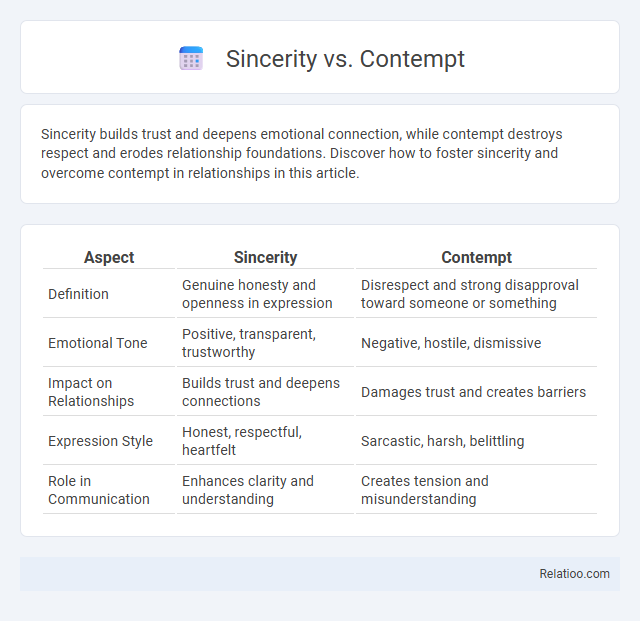Sincerity builds trust and deepens emotional connection, while contempt destroys respect and erodes relationship foundations. Discover how to foster sincerity and overcome contempt in relationships in this article.
Table of Comparison
| Aspect | Sincerity | Contempt |
|---|---|---|
| Definition | Genuine honesty and openness in expression | Disrespect and strong disapproval toward someone or something |
| Emotional Tone | Positive, transparent, trustworthy | Negative, hostile, dismissive |
| Impact on Relationships | Builds trust and deepens connections | Damages trust and creates barriers |
| Expression Style | Honest, respectful, heartfelt | Sarcastic, harsh, belittling |
| Role in Communication | Enhances clarity and understanding | Creates tension and misunderstanding |
Understanding Sincerity: Definition and Importance
Sincerity refers to genuine honesty and transparency in communication, fostering trust and authentic relationships. Unlike contempt, which involves disdain or disrespect, sincerity emphasizes openness and respect for others' feelings. Understanding sincerity is crucial for your personal growth and effective social interactions, as it promotes genuine connections and emotional clarity.
The Core Traits of Sincere Behavior
Sincere behavior is characterized by genuine honesty, authenticity, and consistent actions aligned with true feelings, fostering trust and positive social connections. In contrast, contempt involves disdain, disrespect, and a sense of superiority, often leading to negative interpersonal outcomes and emotional distancing. Understanding the core traits of sincerity--including openness, transparency, and empathy--helps differentiate it from contemptuous attitudes that undermine relationships.
What Drives Contempt in Human Interactions
Contempt in human interactions is driven primarily by feelings of moral superiority and perceived disrespect, often stemming from habitual negative judgments and unresolved interpersonal conflicts. This emotion contrasts sharply with sincerity, which fosters trust and openness by emphasizing genuine and honest communication. Understanding the psychological roots of contempt, including its association with social hierarchies and emotional defense mechanisms, is essential for addressing and mitigating its impact on relationships.
Psychological Roots: Sincerity vs Contempt
Sincerity stems from genuine emotional alignment and transparency, reflecting trustworthy and authentic interpersonal connections. Contempt originates from deep-seated resentment, superiority, and moral judgment, often linked to perceived threats or unresolved psychological conflicts. The psychological roots distinguish sincerity as an expression of empathy and respect, while contempt emerges from defensive mechanisms and social dominance dynamics.
Social Impacts of Sincerity in Relationships
Sincerity fosters trust and emotional safety, enhancing communication and deepening connections in relationships. Your genuine expressions reduce misunderstandings and prevent resentment, promoting long-term social harmony. Unlike contempt, which breeds hostility and alienation, sincerity encourages empathy and mutual respect essential for healthy social bonds.
How Contempt Corrodes Communication
Contempt corrodes communication by introducing disrespect and disparagement that erode trust between individuals. Unlike sincerity, which fosters open and honest dialogue, contempt breeds defensiveness and emotional withdrawal, making productive conversation nearly impossible. Persistent contemptuous behavior damages relationships by creating a toxic environment where meaningful connection and understanding cannot thrive.
Identifying Sincerity and Contempt in Everyday Life
Sincerity is characterized by genuine emotions, open body language, and consistent verbal and nonverbal cues, making it recognizable in honest conversations and authentic interactions. Contempt often manifests through subtle facial expressions like sneering, eye-rolling, and sarcastic tone, signaling disrespect or disdain during social exchanges. Identifying these emotions requires keen observation of microexpressions and contextual behavior patterns that reveal true feelings beneath surface communication in daily life.
Sincerity vs Contempt in the Workplace
Sincerity in the workplace fosters trust, collaboration, and open communication, creating an environment where Your ideas and contributions are valued. Contempt, characterized by disrespect and disdain, undermines team cohesion and leads to decreased morale and productivity. Choosing sincerity over contempt enhances professional relationships and drives overall organizational success.
Cultivating Sincerity: Practical Tips and Strategies
Cultivating sincerity involves authentic self-expression and actively practicing empathy to build trust in relationships. Consistent honesty, mindful listening, and aligning actions with true intentions reduce contempt and foster genuine connections. Developing emotional awareness and vulnerability strengthens sincerity, creating a foundation for meaningful interpersonal interactions.
Overcoming Contempt for Healthier Connections
Overcoming contempt is essential for cultivating healthier relationships, as contempt often leads to emotional distance and resentment. Practicing sincere communication and empathy fosters mutual respect, which helps dissolve contemptuous feelings. Building awareness around contemptuous behaviors allows individuals to replace negativity with understanding and compassion, strengthening emotional bonds.

Infographic: Sincerity vs Contempt
 relatioo.com
relatioo.com